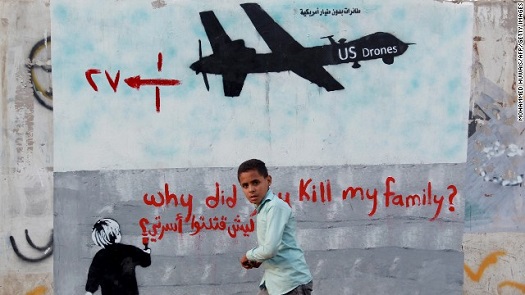
Planes are in the news this week, though the one getting most of the attention was manned. People are desperately trying to discern the motive for 27-year-old German Andreas Lubitz’ decision to calmly place his passenger jet into a gradual dive, lock out his co-pilot, and slam the machine into the side of a mountain. Since Lubitz is a white non-Muslim, he enjoys the privilege in the American media of having thoughts and feelings instead of being a “rabid monster” for whom even trying to determine an explanation for his acts is considered abhorrent. Instead, in the new racism and religionism of the 21st century, he gets full credit for having a brain and discernible motives. Disliking your life is considered rational or at least explainable, while disliking the West and its ongoing robot-war on the homes and villages of Somalia, Yemen, Pakistan, Afghanistan, Iraq, and Syria is just so irrational we can’t even begin to fathom it.
Of course, no one is going to defend Lubitz’ decision to take down the otherwise very safe Lufthansa jet, which is where the mental health piece comes into the equation. We are at this fascinating crossroads in the West where everyone decries the “stigma” surrounding depression and what are perceived to be mental health challenges, yet every time a white person kills people en masse, the purported solution is to make sure anyone who has ever been counseled for depression in their past has no rights whatsoever. By framing every mass-shooting or suicide plane as an issue of lack of mental health interventions, trotting out the history of counseling or diagnoses of the perpetrator, we are actually further stigmatizing not only depression but seeking treatment for it. Like so many policies around mental health, all of the decisions and perspectives are authored by people who consider themselves completely happy and sane and consider depression, let alone suicidalism, to be this bizarre foreign landscape to be approached at 30,000 feet.
The problem is that, in a post-9/11 world, the only reaction anyone has to unfortunate events is that they must be prevented, either through violence or restrictions on freedom. If the people to whom we cannot ascribe motivation or rationality threaten our safety, we must slaughter them like the animals we perceive them to be. If the people to whom we ascribe a broken or mentally ill motivation threaten our safety, we must limit their abilities such that they do not control firearms, jet planes, motor vehicles, or perhaps their own decisions at all. The idea of not having perfect and utter control over the absolute physical safety of every man, woman, and child in society simply does not occur to us.
This despite the fact that the only reason Lubitz was able to lock out his co-pilot and commit to the fatal descent of his plane was because of post-9/11 overreactions. And the fact that everyone involved with airline security and safety is saying as plainly as they can that there is nothing that can be done to prevent a suicidal pilot from taking 149 others with him on his self-inflicted death spiral.
You can bet that the West will not take that for an answer, no matter how true it is. Already, the drumbeat is up to turn heavily autopiloted flights into fully automated ones, to transform jets into drones. Leaving out the fact that the main reason for placing live pilots in the cockpit is because they have a vested interest in the plane’s survival – namely, it is tied to their own. And the occasional suicidal individual aside, this is a pretty good motivator for most people. It is perhaps challenging to imagine a pilot like Sully landing a plane in the Hudson from an air-conditioned room in Nevada. Not necessarily because he lacks the skill or even the interest in saving the plane, but because protocols in that kind of detachment become about risk-minimization and on-paper probabilities. It takes someone motivated by their own survival instinct to have the creativity to actually get out of these kinds of harrowing safety hazards that planes can create.
The world of drones is all about replacing reality with on-paper probabilities, with disastrous consequences. The other plane-related news of the week is the somewhat surprising move of a Saudi-led coalition of Arab nations to start bombing the daylights out of Yemen, a nation recently taken by rebel forces. The instability and deterioration of the national situation in Yemen is trumped only by that in other targets of drone strikes – Syria, Iraq, Somalia, Afghanistan, and Pakistan. You can ignore the testimony of villagers living under the constant threat of unseen death-by-sky and merely examine the anger and anguish of those who are actually hit by something, whether they were working against the US in the first place or not. Can you even personally imagine living in a nation that is threatened daily by the possibility of an American blitz of invisible robot planes that kill in an instant? Can you contemplate the fury you would feel about this situation and its perpetrators? We were ready to kill everyone and eliminate all rights in society after one 9/11 event. And while the daily scale of magnitude is smaller, the constant and persistent outrage of unwarranted attack goes on and on and on. An America under this deluge probably would have lobbed nukes at every other nation by now.
And yet we persist in being unable to understand why this practice would anger anyone or create more enemies for the nation doing it. It’s bombing the village to save it all over again. How can they not understand that the rubble we are creating and the bodies we strew mean FREEDOM?
As is predictable, things have gone completely to hell in these nations in a way unseen in un-droned nations (with the possible exception of the Democratic Republic of Congo). I listened this morning as a series of NPR announcers fumbled over the tangled conglomerate of alliances and proxies and how the US is de facto supporting Iran’s opposition to ISIS in Iraq and Syria while de facto opposing Iranian-backed rebels in Yemen. The problem is that indiscriminately bombing people who disagree with you just creates chaos on a massive scale and does nothing to stabilize a region or improve the outcomes for its people. It does exponentially increase rage and tragedy, sowing opposition to the authors of this mayhem. No matter how much you hate the local rebels or ISIS or anyone else, you’re never going to forgive the US for killing your family inadvertently in their effort to wage that war. And that’s giving the US maximal benefit of the doubt on intelligence and sincerity, which is completely unearned in these theaters.
The question always arises of whether it is malignancy or stupidity that is the primary factor behind these decisions by the US and its droning army. Does the US subversively recognize that the only way to maintain power over an unpredictable group of foreign nations is to keep them in a state of perpetual chaos and war? Does it want war without end to fuel growth in the military-industrial complex, constantly generating new threats of failed states that require even more bombing into submission? Or does the US genuinely think the rain of explosives is helping the situation, that it will eventually convince people to love the nation that brought all this death and destruction from the too-high sky?
In either case, malignancy and stupidity are things we should stop. No matter how afraid we feel, no matter how much we want to control every tiny little factor that could limit our safety. Because this obsession with safety is making us less safe. Killing everyone who disagrees with us on foreign soil just makes more people want to kill us. Locking up or limiting job prospects for everyone who gets really sad just deters people who are sad from getting help. And makes it more likely, not less, that they will snap someday and take a plane into a mountain. These things you think you’re doing to make the world safer, out of fear, are just manifesting what you fear the most.
The only way to live more safely is to accept that your own safety is not something you might be able to control. Every time you get into a motor vehicle, be it plane, train, or automobile, you have to cede some of this control. Heck, every time you leave your house, you have to. And that’s okay. Other people can make you unsafe if they really want to. But only you can make yourself live a life that is not so governed by this threat that it’s not worth living anyway.


